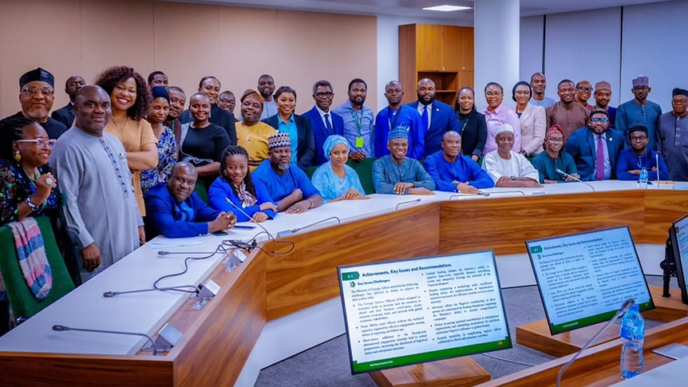BY BEULAH ADEOYE
When we talk about the pathways to industrialisation, it’s easy to focus on infrastructure, education, power, tourism, security, investments, and resources. However, one key factor often overlooked in discussions about economic growth is the role of workers’ savings.
These financial reserves, accumulated through years of hard work, are not just a cushion for personal security — they are also an important catalyst for economic development and industrialisation.
For Oyo state to truly industrialise, it must consider how workers’ savings can be harnessed to drive growth. In this series, we’ll explore the importance of workers’ savings, the impact they can have on local economies, and the potential role they can play in Oyo state’s industrial future. We will also look at how countries like Singapore and Rwanda have leveraged savings to fuel economic development and what Oyo can learn from them.
Advertisement
Workers’ savings serve as a critical source of capital, not only for personal wealth-building but also for larger economic development. These savings can fuel investment in businesses, startups, and infrastructure projects that create new jobs, stimulate productivity, and contribute to industrial growth.
In the context of Oyo state, the majority of workers are in agriculture, manufacturing, and services (including civil servants). The saving habits of these workers can play a key role in:
1. Capital for Small and Medium Enterprises (SMEs): When workers save a portion of their income, these savings can be pooled together to create businesses that generate more employment opportunities. Small and medium enterprises are the backbone of any industrial economy, and workers’ savings can act as an internal funding mechanism for these businesses.
Advertisement
2. Investment in Housing and Real Estate: As the state industrialises, there will be an increasing demand for housing, retail spaces, and industrial zones. Workers’ savings can help fund this expansion, particularly in the construction and real estate sectors, providing opportunities for employment while also enhancing the state’s infrastructure.
3. Financing Infrastructure Projects: Workers’ savings, when invested wisely, can be used to fund larger infrastructure projects, from road construction to industrial parks. In other countries, savings schemes such as pension funds, cooperative savings, and microfinance have successfully been used to fund large public projects that benefit the workforce and industries at large, when harnessed properly.
Both Singapore and Rwanda have harnessed the potential of savings to fuel their rapid industrialisation. Let’s look at how they did it:
In Singapore, the government established the Central Provident Fund (CPF) in 1955 as a mandatory savings scheme that requires workers to save a portion of their income. These savings are then used to fund housing, healthcare, and retirement benefits. Over the years, the CPF has helped Singaporeans build wealth, while also providing a capital base for major infrastructure projects. The savings of workers have been key to financing the country’s industrialisation, housing developments, and infrastructure, turning Singapore into a global economic powerhouse.
Advertisement
The idea of worker savings accounts can easily be replicated in Oyo state. By establishing a system where workers contribute a portion of their income to a savings fund, the state can create a pool of funds that can be reinvested in industrial projects and infrastructural development.
Rwanda’s approach to workers’ savings involves a strong focus on community-based savings. The country has promoted savings cooperatives and microfinance institutions to allow low-income earners to pool resources for both personal and community development. Through these collective savings schemes, Rwandans are able to invest in local businesses, agriculture, and even education, thus fueling the broader national industrialisation process.
Similarly, Oyo state could establish local cooperative savings programs in both urban and rural areas. These savings could be reinvested into community development projects such as agricultural cooperatives, small industries, and local infrastructure, contributing to the industrial growth of the state.
While workers’ savings hold great potential in Oyo state, several challenges need to be addressed in order to unlock their full value:
Advertisement
1. Low Savings Rates: The average worker in Oyo state may struggle to save due to low wages and limited financial literacy. Without the right financial education and incentives, savings rates can remain low, hindering the ability to invest in industrial projects or local enterprises.
2. Lack of Access to Financial Products: Many workers in Oyo state lack access to formal savings products like savings accounts, insurance schemes, and investment opportunities. Without these tools, workers are less likely to save or invest in the local economy.
Advertisement
3. Low Trust in Financial Institutions: In some communities, there is a deep mistrust of formal financial institutions, which can discourage workers from saving. Oyo state needs to establish trusted, transparent, and accessible financial institutions that workers feel confident in using.
Despite these challenges, there are significant opportunities:
Advertisement
1. Financial Literacy Campaigns: Government and private sector partnerships can roll out financial literacy programs to teach workers the value of savings and investment, providing them with the tools to better manage their finances.
2. Government-Supported Savings Schemes: Oyo State could implement its own version of the Provident Fund or a similar mandatory savings system, where a portion of workers’ salaries is automatically set aside for savings. The state could provide incentives, like tax breaks or access to low-interest loans, to encourage workers to participate in these schemes.
Advertisement
3. Microfinance Institutions and Cooperatives: Establishing and supporting local microfinance institutions and savings cooperatives would allow workers to pool resources and invest in both personal and community projects. These small-scale financial institutions can be critical in helping workers save and invest in the local economy.
4. Local Investment Channels: As Oyo state develops its industrial capacity, workers’ savings can be directed into local businesses or industries through investment platforms or worker cooperatives, encouraging both personal and community wealth-building.
For the workers of Oyo state to contribute to the industrialisation process, they must actively participate in the savings process:
– Start Saving Today: Even a small percentage of a worker’s income, saved regularly, can accumulate over time to become a significant resource for investment. The habit of saving should be instilled from an early age, and every worker must be encouraged to start saving.
– Join Savings Cooperatives: Workers should consider joining savings cooperatives or local microfinance schemes, which pool resources for community development and personal wealth-building.
– Invest in Local Businesses: Workers’ savings can be directed into local businesses, either through direct investment or through community savings schemes. This helps to stimulate local economies and fosters an environment where industries can thrive.
– Advocate for Financial Literacy: By advocating for and participating in financial literacy programs, workers can better understand how their savings can be used for both personal and collective growth.
Conclusion: A call to action
The establishment of a Sovereign Wealth Fund for Oyo state by His Excellency, Governor Seyi Makinde exemplifies visionary leadership and a commitment to long-term economic stability. Approved by the State Executive Council in March 2025, this fund aims to generate wealth through diversification and prudent investment practices, transforming financial assets into tangible benefits for the masses, with the economic potential to generate up to USD 250 million from this initiative within the next few years.
This initiative is a testament to His Excellency’s dedication to sustainable economic growth and financial prudence. By establishing the Sovereign Wealth Fund, he is not only ensuring economic stability but also fostering long-term wealth creation, infrastructural development, and diversification of revenue sources for Oyo state.
Encouraging savings among the people of Oyo state is crucial for the success of this fund. Just as workers’ savings have contributed to the creation of major global projects, such as the construction of the Hoover Dam in the United States, the development of Singapore’s Changi Airport, the establishment of the UK’s National Health Service, Australia’s superannuation system funding infrastructure, and the China–Pakistan Economic Corridor, collective savings can drive transformative change. In Oyo state, initiatives like the Sovereign Wealth Fund can harness the power of local savings to fund infrastructure projects, support small businesses, and improve public services, leading to a more prosperous future for all.
The success of these global projects underscores the power of collective savings in driving economic development. Similarly, the Sovereign Wealth Fund in Oyo state can serve as a catalyst for growth, providing the necessary capital to invest in critical infrastructure, education, and healthcare. By encouraging residents to save and invest in their state’s future, Oyo can build a resilient economy that benefits all its citizens. This initiative not only promotes financial discipline but also fosters a sense of ownership and pride among the people, ensuring that the state’s resources are utilized for the collective good.
Oyo state’s industrial future will depend on more than just infrastructure and foreign investment—it will require the collective savings and efforts of its workers. By empowering workers to save and invest, Oyo state can create a sustainable growth model that benefits both individuals and the broader industrial landscape.
It’s time for the workers of Oyo state to step up and play an active role in the economic transformation of the state. Whether through personal savings, cooperative efforts, or investments in local industries, the future of Oyo state’s industrialisation is in our hands.
Let’s begin saving today for a prosperous tomorrow.
Views expressed by contributors are strictly personal and not of TheCable.










